
Kalsoy Island: The Enchanted Isle of the Faroe Islands
Kalsoy Island, often referred to as the 'Flute' due to its distinctive shape, is a hidden gem in the Faroe Islands. This enchanting island offers a unique blend of dramatic landscapes, rich folklore, and untouched nature. Visitors are drawn to Kalsoy for its striking scenery, including towering cliffs, deep valleys, and picturesque fjords that provide endless opportunities for hiking and photography. One of the island's most notable attractions is the Kallur Lighthouse, perched majestically on a cliff with panoramic views of the North Atlantic Ocean. The hike to the lighthouse is a must-do for adventurers, offering breathtaking vistas that make every step worthwhile. Along the way, you might encounter sheep grazing freely on the lush green meadows, adding to the island's charm. Kalsoy is also steeped in legend and mystery. The village of Mikladalur is home to the famous Seal Woman statue, inspired by a local legend about a seal who transformed into a beautiful woman. The island's small, quaint villages, such as Trøllanes and Syðradalur, provide a glimpse into the traditional Faroese way of life, with their colorful houses and friendly locals. Whether you're an avid hiker, a nature lover, or a history enthusiast, Kalsoy Island promises an unforgettable experience. Its serene atmosphere, combined with its natural beauty and cultural heritage, makes it a perfect destination for those looking to explore the Faroe Islands beyond the usual tourist spots.
Local tips in Kalsoy Island
- Check the ferry schedule in advance, as services to Kalsoy can be infrequent and are subject to weather conditions.
- Wear sturdy hiking boots for the trek to Kallur Lighthouse; the path can be steep and uneven.
- Visit the village of Mikladalur to see the Seal Woman statue and learn about local folklore.
- Pack a picnic and enjoy a meal with a view at one of the island's many scenic spots.
- Respect the local wildlife and remember that sheep have the right of way on the trails.
Kalsoy Island: The Enchanted Isle of the Faroe Islands
Kalsoy Island, often referred to as the 'Flute' due to its distinctive shape, is a hidden gem in the Faroe Islands. This enchanting island offers a unique blend of dramatic landscapes, rich folklore, and untouched nature. Visitors are drawn to Kalsoy for its striking scenery, including towering cliffs, deep valleys, and picturesque fjords that provide endless opportunities for hiking and photography. One of the island's most notable attractions is the Kallur Lighthouse, perched majestically on a cliff with panoramic views of the North Atlantic Ocean. The hike to the lighthouse is a must-do for adventurers, offering breathtaking vistas that make every step worthwhile. Along the way, you might encounter sheep grazing freely on the lush green meadows, adding to the island's charm. Kalsoy is also steeped in legend and mystery. The village of Mikladalur is home to the famous Seal Woman statue, inspired by a local legend about a seal who transformed into a beautiful woman. The island's small, quaint villages, such as Trøllanes and Syðradalur, provide a glimpse into the traditional Faroese way of life, with their colorful houses and friendly locals. Whether you're an avid hiker, a nature lover, or a history enthusiast, Kalsoy Island promises an unforgettable experience. Its serene atmosphere, combined with its natural beauty and cultural heritage, makes it a perfect destination for those looking to explore the Faroe Islands beyond the usual tourist spots.
When is the best time to go to Kalsoy Island?
Iconic landmarks you can’t miss
The Seal Woman (Kópakonan)
Explore the enchanting Seal Woman sculpture in Mikladalur, a captivating blend of Faroese folklore and stunning coastal views.
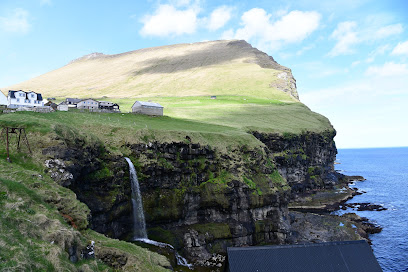
Tjóðsavnið (Faroe Islands National Museum)
Explore the rich cultural and natural history of the Faroe Islands at Tjóðsavnið, a captivating museum in Hoyvík.
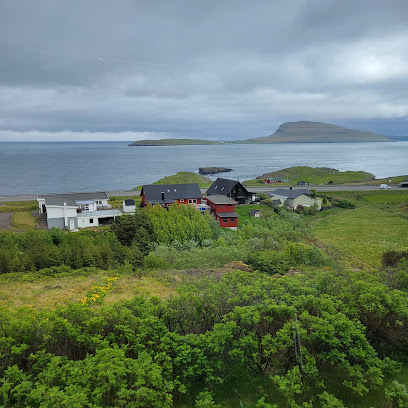
Kallur Lighthouse
Discover the breathtaking Kallur Lighthouse on Kalsoy, where stunning views and rich maritime history await every traveler in the Faroe Islands.
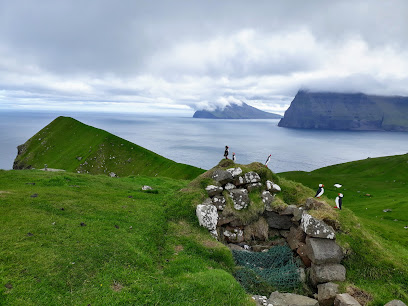
Klakkur
Discover the stunning Klakkur mountain in the Faroe Islands, offering breathtaking views and unforgettable hiking experiences for all nature enthusiasts.
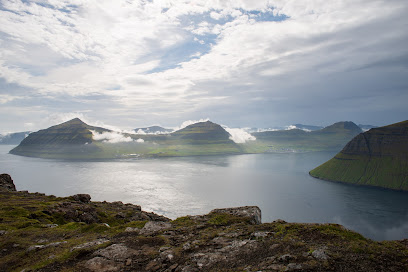
Slættaratindur
Explore Slættaratindur, the highest peak in the Faroe Islands, and witness breathtaking views that create unforgettable memories in nature's paradise.
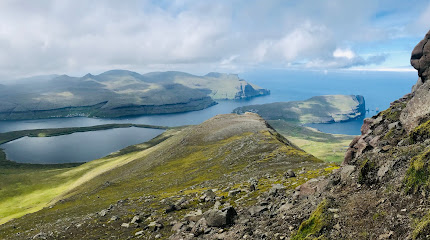
Svartafoss Waterfall
Discover the breathtaking beauty of Svartafoss Waterfall, a stunning natural gem in the Faroe Islands framed by unique basalt columns.
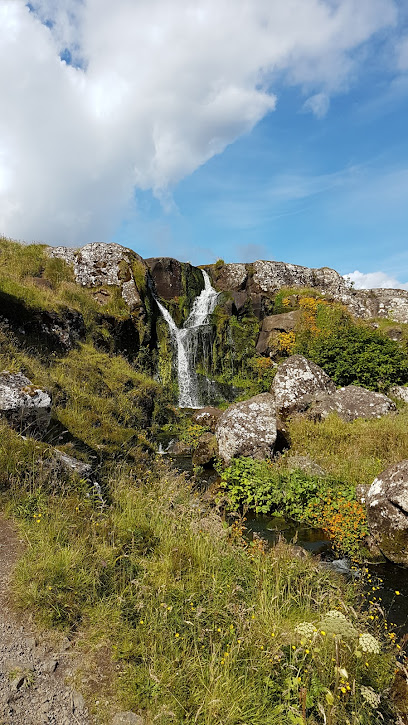
Kalsoy
Discover the breathtaking beauty of Kalsoy, an island in the Faroe Islands, with its dramatic cliffs, picturesque villages, and stunning hiking trails.
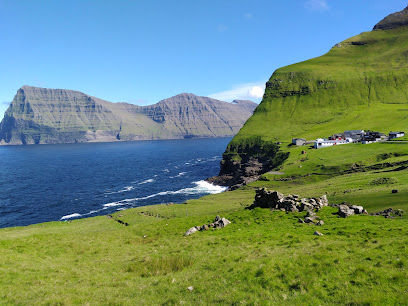
James Bond Gravestone
Discover the James Bond Gravestone in the breathtaking Faroe Islands, where cinematic history meets stunning natural landscapes.
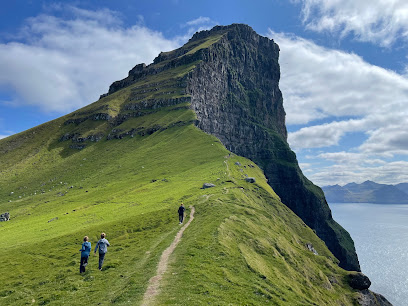
Kallur Lighthouse Trailhead
Discover the scenic beauty of Kallur Lighthouse Trailhead in the Faroe Islands, where breathtaking views and adventurous hikes await.
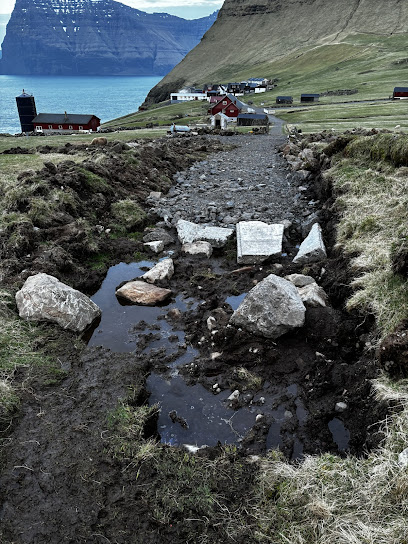
Fuglafjørður Viewpoint
Explore stunning vistas and serene landscapes at Fuglafjørður Viewpoint in the breathtaking Faroe Islands, a perfect escape for nature lovers and photographers alike.
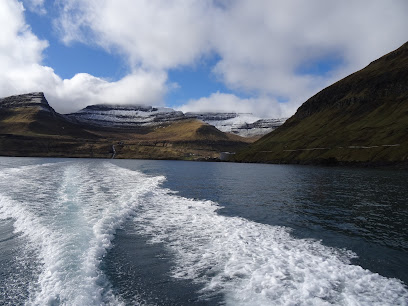
Sculture
Discover the stunning Sculpture in Tórshavn, where art meets the breathtaking landscapes of the Faroe Islands, creating a unique cultural experience.
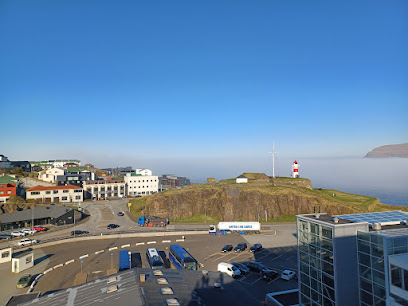
Unmissable attractions to see
Vestmanna Tourist Centre
Explore the Faroe Islands from Vestmanna: Boat tours, history, and local flavors await at this charming tourist center.
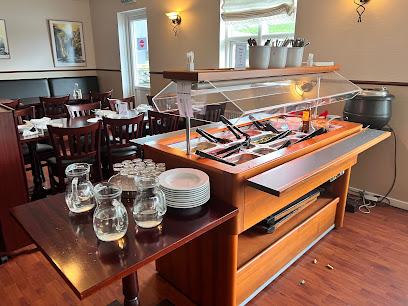
Kallur Lighthouse Trailhead
Hike to Kallur Lighthouse on Kalsoy Island for breathtaking views of dramatic cliffs, rugged coastlines, and the vast Atlantic Ocean.
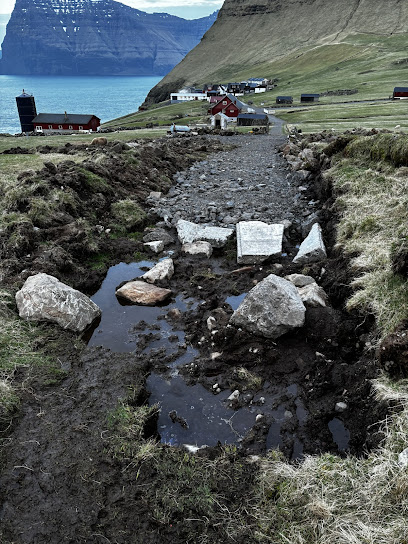
Vestmanna
Explore the dramatic Vestmanna sea cliffs and immerse yourself in Faroese history in this charming village on Streymoy Island.
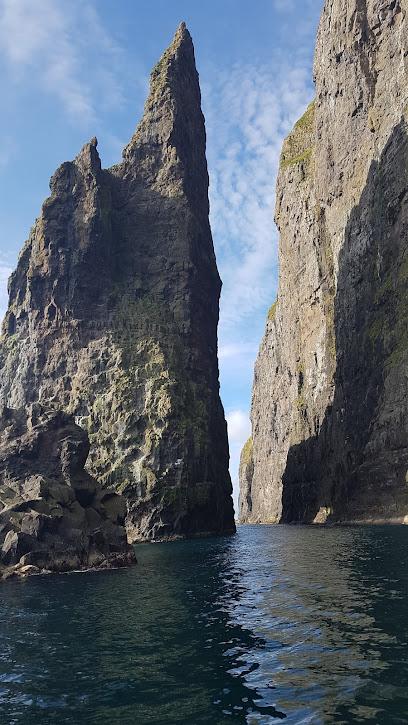
Essential places to dine
Fríða Kaffihús
Discover delicious coffee and rich history at Fríða Kaffihús in Klaksvík - where taste meets tradition.
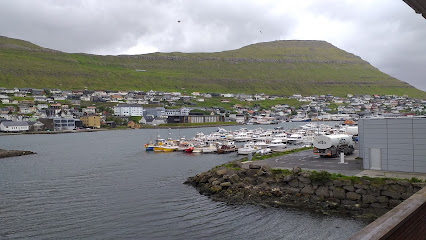
Katrina Christiansen
Savor authentic Scandinavian cuisine at Katrina Christiansen in Tórshavn, where local flavors meet exceptional dining experiences.
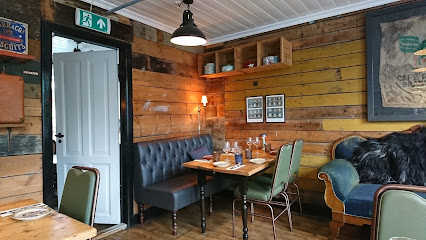
Angus Steakhouse
Discover premium steaks and local flavors at Angus Steakhouse in Tórshavn, where culinary excellence meets Faroese hospitality.
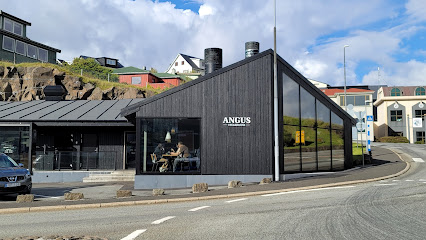
Gjaargardur Guesthouse Gjogv
Savor authentic Faroese cuisine at Gjaargardur Guesthouse in Gjogv while enjoying breathtaking views of nature's beauty.
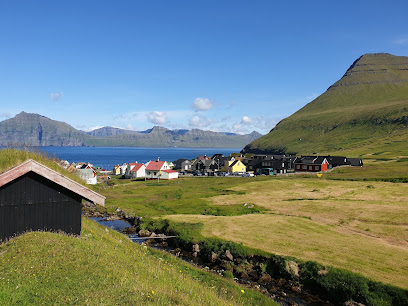
Áarstova
Discover Áarstova: A premier dining destination in Tórshavn offering authentic Faroese cuisine amidst stunning island scenery.
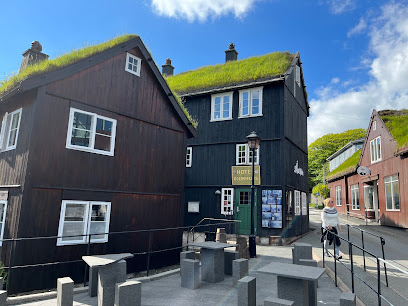
Barbara Fish House
Discover exquisite seafood dining at Barbara Fish House in Tórshavn—where local flavors meet culinary excellence.
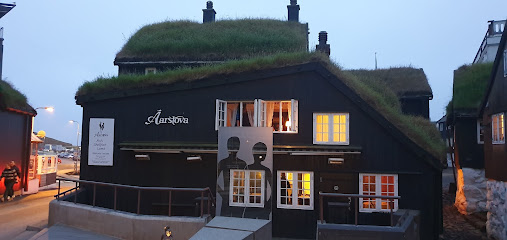
Koks Restaurant
Experience unparalleled Faroese cuisine at Koks Restaurant amidst breathtaking landscapes in Leynavatn.
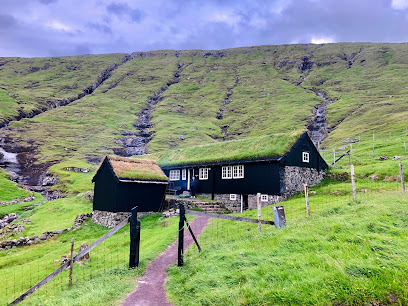
Rose's Restaurant & Catering
Experience authentic Faroese cuisine at Rose's Restaurant & Catering, where local flavors meet breathtaking views in the heart of Ljósá.
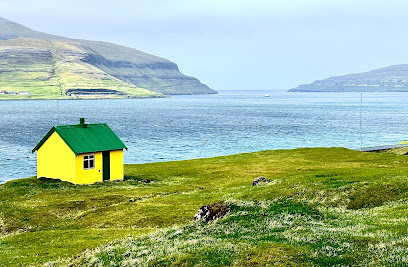
Angus Steakhouse Klaksvík
Experience exceptional dining at Angus Steakhouse Klaksvík – where premium meats meet Faroese hospitality in stunning surroundings.
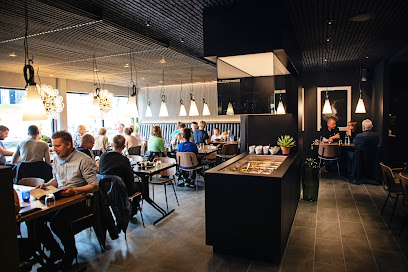
Kafé Kaspar
Discover Kafé Kaspar in Tórshavn – your go-to café for delightful coffee, scrumptious bagels, and a warm atmosphere in the heart of the Faroe Islands.
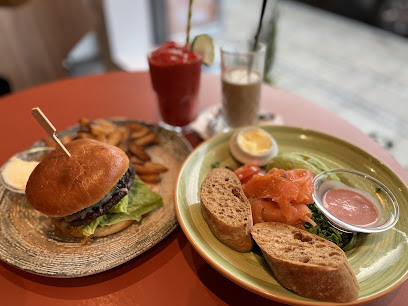
Fisk og Kips
Experience authentic Faroese fish and chips at Fisk og Kips in Tórshavn – fresh flavors without breaking the bank.
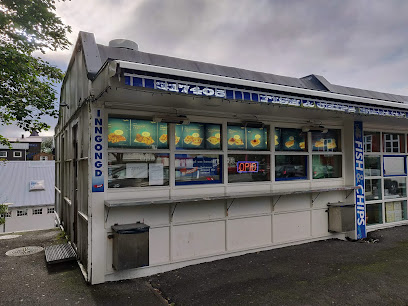
Kafe Umami
Discover Kafe Umami in Tórshavn: Where Local Flavors Meet Culinary Creativity in a Cozy Atmosphere.
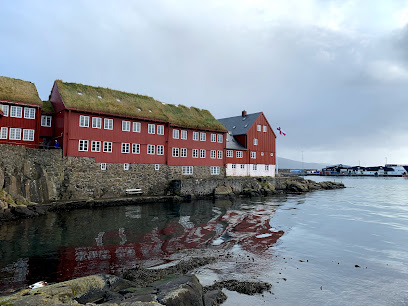
Suppugarðurin
Discover Suppugarðurin in Tórshavn for an unforgettable ramen experience blending Faroese ingredients with traditional Japanese flavors.
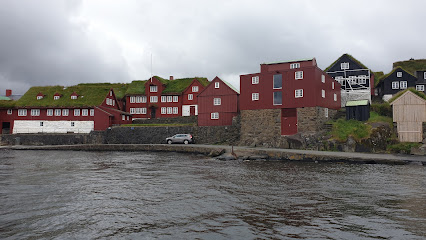
Muntra
Experience authentic Faroese cuisine at Muntra in Fuglafjørður, where fresh ingredients meet culinary artistry for an unforgettable dining experience.
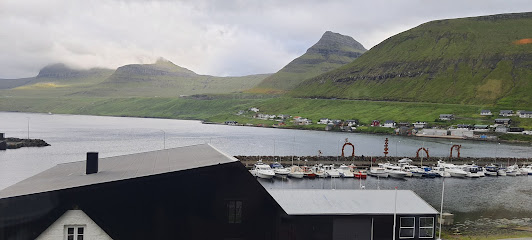
hvonn
Experience authentic Faroese cuisine at Hvonn in Tórshavn - where local ingredients meet modern gastronomy.
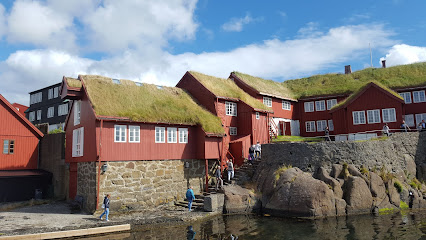
Markets, malls and hidden boutiques
Kallur Lighthouse
Discover the breathtaking vistas and serene beauty of Kallur Lighthouse, a must-visit attraction in the stunning Faroe Islands.
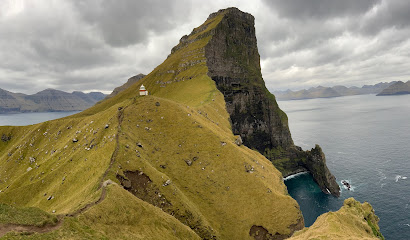
Kioskin
Discover Kioskin in Trøllanes, a charming general store showcasing local goods and Faroese culture in the breathtaking Faroe Islands.
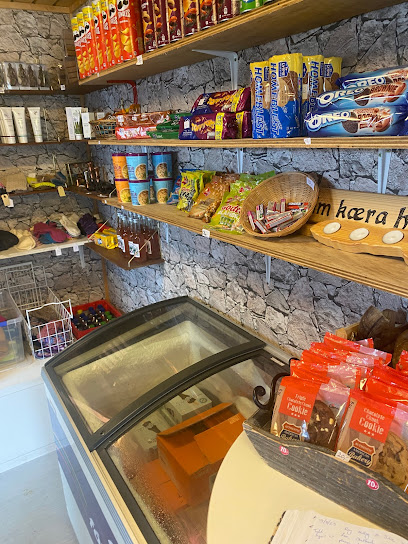
Føroya Keypsamtøka
Discover the best of Faroese flavors at Føroya Keypsamtøka in Klaksvík, a local supermarket offering fresh produce and culinary delights.
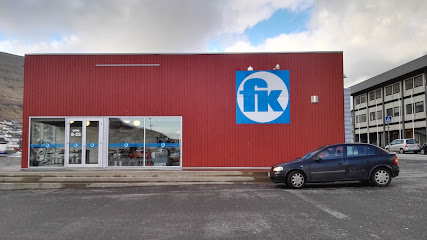
Rúsdrekkasøla Landsins - Klaksvík
Explore the vibrant beverage culture of the Faroe Islands at Rúsdrekkasøla Landsins in Klaksvík, featuring local beers, wines, and spirits.
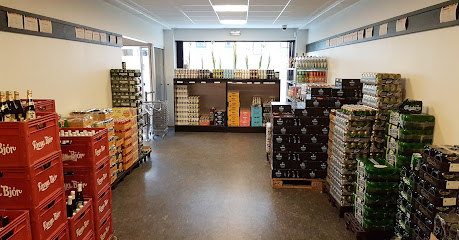
FK fuglafjørður
Explore local flavors at FK Fuglafjørður, your go-to grocery store in the heart of the picturesque Faroe Islands.
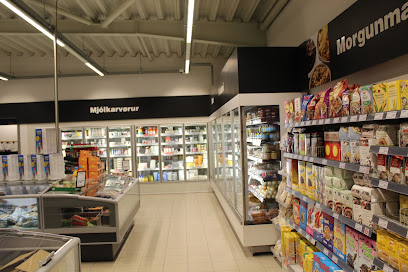
A shop
Explore the essence of Faroese culture at A Handil Supermarket, where local flavors and fresh produce await your discovery.
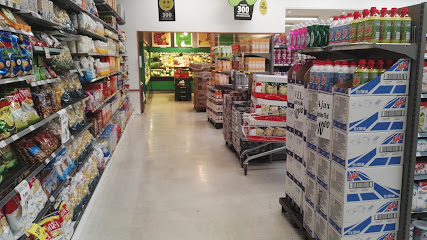
Á Sandoyggin
Discover local flavors and fresh produce at Á Sandoyggin, the charming grocery store in Skopun, Faroe Islands.
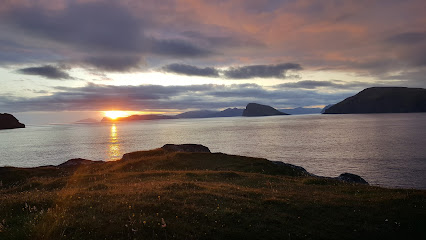
Norðoya Heimavirki
Explore authentic Faroese fashion at Norðoya Heimavirki, a treasure trove of handmade knitwear in Klaksvík, Faroe Islands.
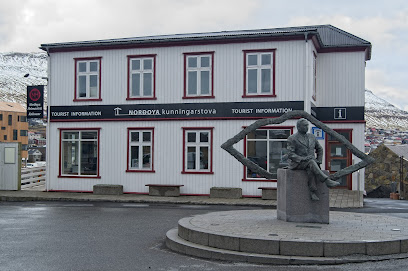
Ullvøruhúsið
Discover authentic Faroese fashion at Ullvøruhúsið, where quality wool garments and local craftsmanship come together in Tórshavn.
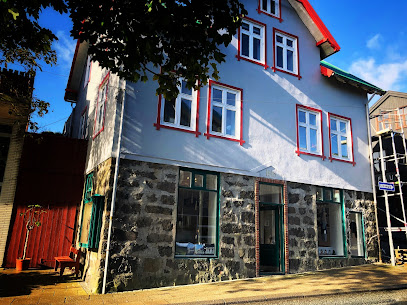
Fjord by Suffía Nón
Explore Fjord by Suffía Nón, a unique gift shop in Fuglafjørður offering local crafts and souvenirs that reflect the beauty of the Faroe Islands.
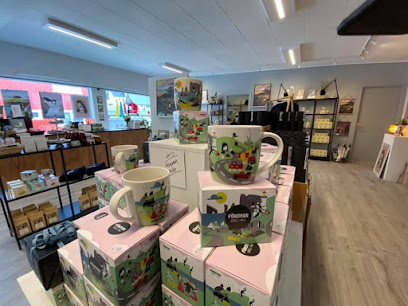
Rit & Rák
Discover the literary treasures of Tórshavn at Rit & Rák, where every book tells a story and the local culture comes alive.
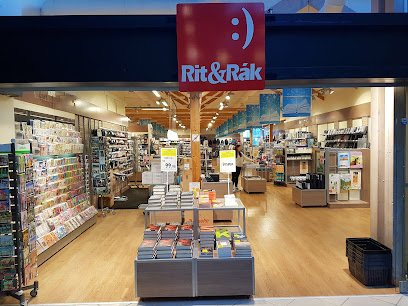
Rokoko
Discover the essence of Faroe Islands fashion at Rokoko, a clothing store blending local style with international trends in the heart of Nordragota.

Glimmur
Explore Glimmer in Tórshavn - Your destination for unique gifts and authentic Faroese craftsmanship.
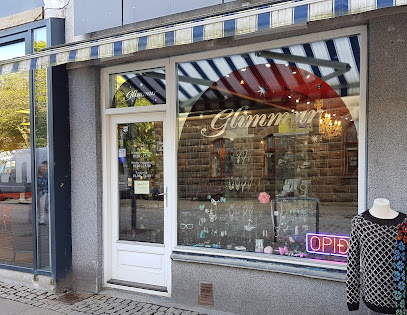
Fossabúðin
Discover local flavors and essentials at Fossabúðin, a charming grocery store in Norðdepil, Faroe Islands, where adventure meets authentic cuisine.
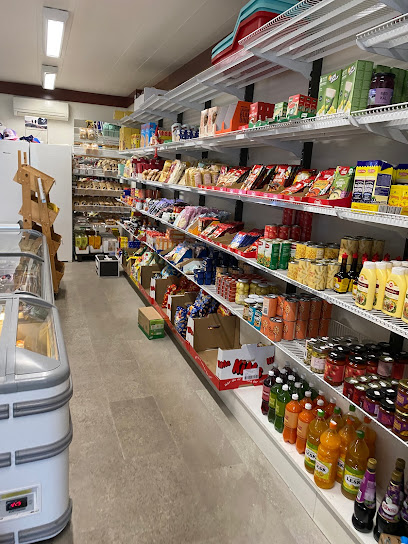
Á Haraldsen
Discover local flavors and everyday essentials at Á Haraldsen, Fuglafjørður's favorite grocery store in the enchanting Faroe Islands.
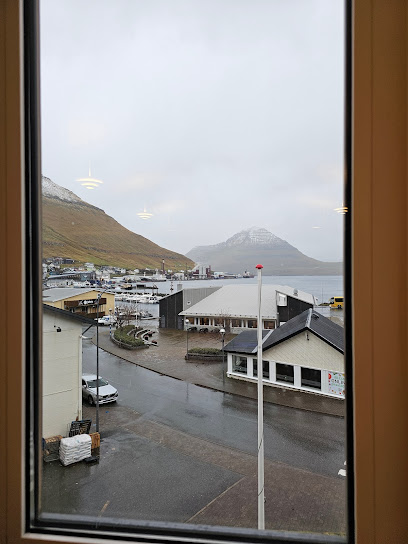
Essential bars & hidden hideouts
Irish Pub Torshavn
Discover the charm of Irish Pub Torshavn, where traditional cuisine meets a lively atmosphere in the heart of Tórshavn, Faroe Islands.
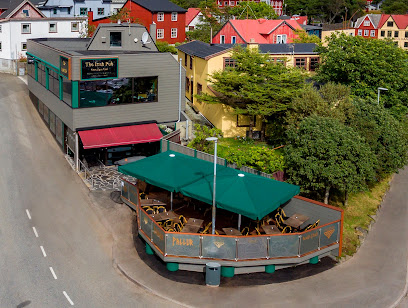
Sirkus Bar
Experience Tórshavn's vibrant nightlife at Sirkus Bar, where local flavors meet international cocktails in a lively atmosphere.
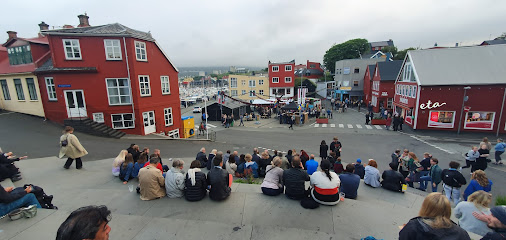
Angus Steakhouse Klaksvík
Indulge in the finest steaks and local flavors at Angus Steakhouse Klaksvík, where every meal is a celebration of Faroese culinary traditions.
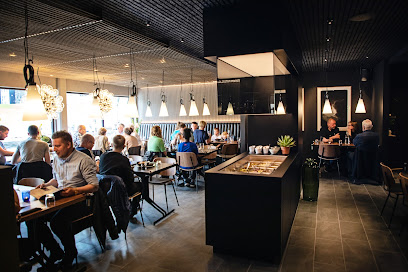
Mikkeller Tórshavn
Discover Mikkeller Tórshavn, a vibrant bar featuring a wide range of craft beers in the scenic capital of the Faroe Islands, Tórshavn.
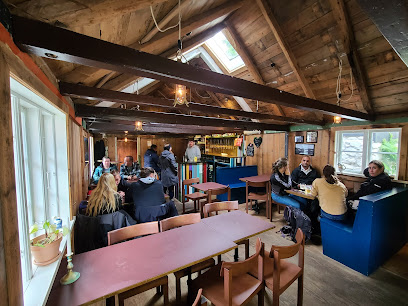
OY Brewing
Discover the unique craft beers and authentic dishes of OY Brewing in Tórshavn, a must-visit brewpub in the Faroe Islands.
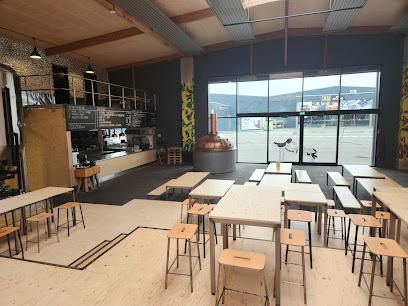
Roykstovan
Experience the vibrant atmosphere and local flavors at Roykstovan, the premier bar in Klaksvík, Faroe Islands.
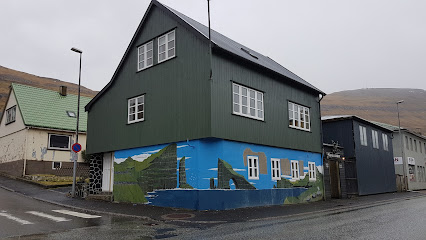
Bovling í Leirvík
Discover the joy of bowling and dining at Bovling í Leirvík, where family fun meets delicious cuisine in the heart of the Faroe Islands.
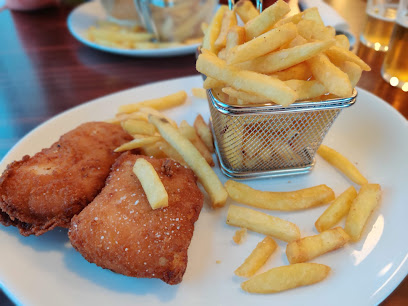
Café Eðge / Cafe Edge
Discover the charm of Café Eðge in Mikladalur, where exquisite flavors meet breathtaking views in the heart of the Faroe Islands.
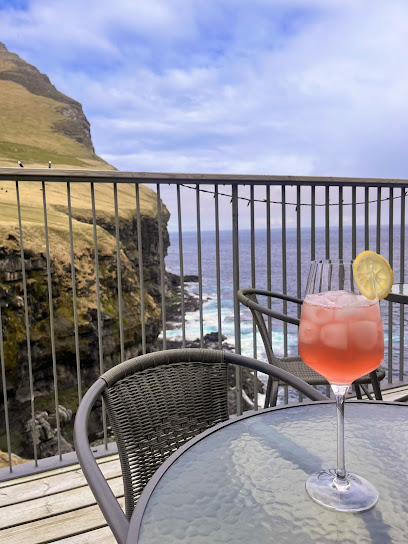
Glitnir
Discover the cozy ambiance and local flavors at Glitnir, Tórshavn's top bar for a relaxing evening in the Faroe Islands.
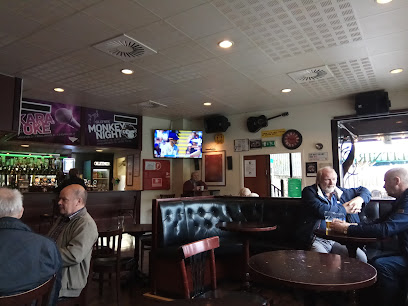
Blábar
Experience the vibrant nightlife of Tórshavn at Blábar, where live music and great drinks create unforgettable moments.
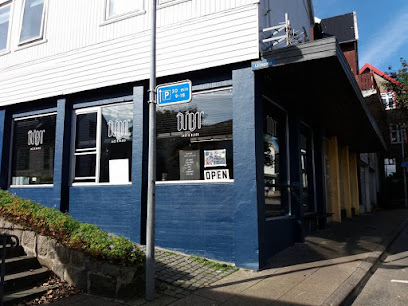
Tórshøll
Experience the vibrant atmosphere of Tórshøll, a bar in Tórshavn offering local drinks and a cozy ambiance for every traveler.
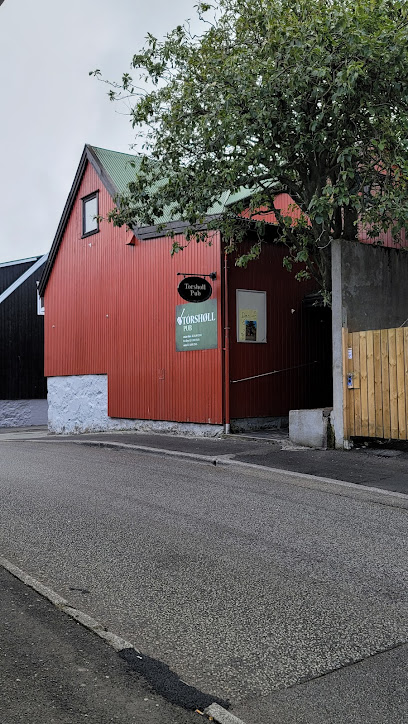
Maverick
Discover the vibrant nightlife at Maverick, Klaksvík's go-to bar for local brews and a lively atmosphere.
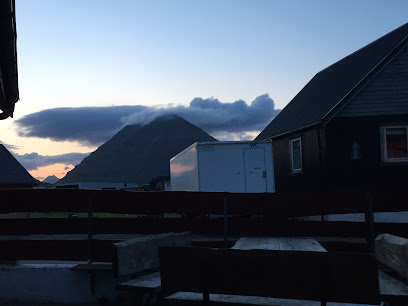
Landskrona Sports Bar
Experience the excitement of live sports in Tórshavn at Landskrona Sports Bar, where great drinks and good times await every visitor.
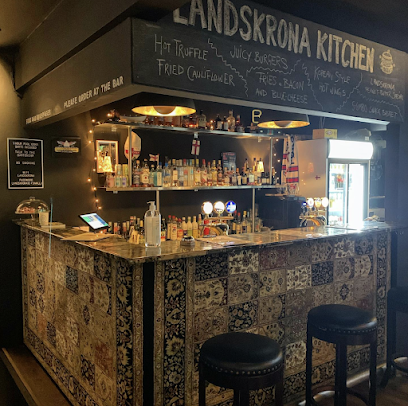
MC Grill
Discover the lively ambiance and mouth-watering dishes at MC Grill, a premier bar and restaurant in Klaksvík, Faroe Islands.
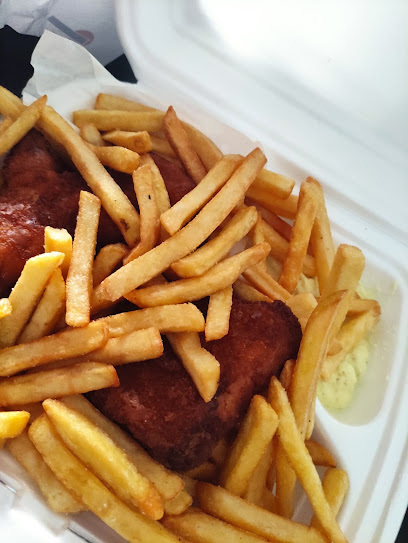
Local Phrases about Kalsoy Island
-
- HelloHallo
[HAH-loh] - GoodbyeFarvæl
[FAHR-vayl] - YesJa
[yah] - NoNei
[nay] - Please/You're welcomeVærsgo
[VAIR-skoh] - Thank youTakk fyri
[tahk FEE-ree] - Excuse me/SorryFyrirgev
[FEER-ir-gehv] - How are you?Hvussu hevur tú tað?
[HVOOS-soo HEV-oohr too taah?] - Fine. And you?Gott. Og tú?
[GOHT. oh too?] - Do you speak English?Talar tú enskt?
[TAH-lahr too ent-skt?] - I don't understandEg skilji ikki
[ey skil-yee IK-kee]
- HelloHallo
-
- I'd like to see the menu, pleaseEg vil síggja matseðilin, vænta
[ey vil SEE-d-yah maht-say-dil-een, VAIN-tah] - I don't eat meatEg eti ikki kjøt
[ey EH-tee IK-kee chyut] - Cheers!Skaal!
[skahl] - I would like to pay, pleaseEg vil gjalda, vænta
[ey vil GYAL-dah, VAIN-tah]
- I'd like to see the menu, pleaseEg vil síggja matseðilin, vænta
-
- Help!Hjálp!
[HYAHLP] - Go away!Far burtur!
[faar BOOR-tuhr] - Call the Police!Ring til Politii!
[RING teel Po-lee-tee] - Call a doctor!Ring til læknari!
[RING teel LAYK-na-ree] - I'm lostEg er týstur
[ey ayr TEW-stoor] - I'm illEg er sjúk
[ey ayr SHYOOK]
- Help!Hjálp!
-
- I'd like to buy...Eg vil keypa...
[ey vil KEH-pah] - I'm just lookingEg bara titi
[ey BAHR-ah TEE-tee] - How much is it?Hvat kostar tað?
[kvat KO-stahr taah?] - That's too expensiveTað er ov dyrt
[taah ayr ohv deert] - Can you lower the price?Kanstu lætta prísin?
[KAN-stoo LAI-tah PREE-sin?]
- I'd like to buy...Eg vil keypa...
-
- What time is it?Hvat er klokkan?
[kvat ayr KLOHK-an] - It's one o'clockTað er eitt
[taah ayr eyt] - Half past (10)Hálvtann tíggju
[HOWL-vtan TEE-ju] - MorningMorgun
[MOHR-gun] - AfternoonEttermiðdagur
[ET-ter-mee-tha-goor] - EveningKvøld
[kvool] - YesterdayÍ gjár
[ee chow-ar] - TodayÍ dag
[ee dah] - TomorrowÍ morgin
[ee MOHR-gin] - 1Eitt
[eyt] - 2Tvær
[tvair] - 3Tríggjar
[TREE-gyar] - 4Fýra
[FEE-ra] - 5Fimm
[feem] - 6Seks
[seks] - 7Sjey
[shay] - 8Átta
[OHT-ta] - 9Ni
[nee] - 10Tíggju
[TEE-ju]
- What time is it?Hvat er klokkan?
-
- Where's a/the...?Hvar er ein/hvussu...?
[kvar air ayn/HVOOS-soo] - What's the address?Hvat er adressan?
[kvat ayr ah-DRESS-an] - Can you show me (on the map)?Kanstu vísa meg (á kortinum)?
[KAN-stoo VEE-sah mey (ow KORT-in-um)] - When's the next (bus)?Hvussu leingi er næsta (buss)?
[HVOOS-soo LAYN-gee ayr NAI-sta (boos)] - A ticket (to ....)Eitt miði (til ....)
[eyt MEE-thee (teel)]
- Where's a/the...?Hvar er ein/hvussu...?
History of Kalsoy Island
-
Kalsoy Island, part of the Faroe Islands, has a history that dates back to the Viking Age. The island's name, which means 'Man Island,' reflects its ancient roots. The first settlers arrived in the 9th century, establishing small communities and engaging in farming and fishing. Archaeological finds, including tools and remnants of longhouses, offer a glimpse into the lives of these early inhabitants.
-
During the medieval period, Kalsoy Island, like the rest of the Faroe Islands, became a significant point of trade in the North Atlantic. The Hanseatic League, a powerful economic and defensive alliance of merchant guilds, played an essential role in this era. The island's strategic location made it a valuable stopover for trade routes, bringing goods and cultural influences from mainland Europe.
-
One of Kalsoy Island’s most famous legends is that of the Seal Woman (Kópakonan). According to local folklore, seals could shed their skins and take human form. The legend tells of a farmer who captured a seal woman by hiding her seal skin, forcing her to become his wife. Years later, she found her skin and returned to the sea, but not before ensuring her human children were left with a curse. This tale is deeply embedded in the island's cultural heritage and is commemorated by a statue in the village of Mikladalur.
-
The 18th and 19th centuries were marked by isolation for Kalsoy Island. Harsh weather conditions and treacherous seas made travel and communication with the outside world difficult. The island's inhabitants relied heavily on agriculture and fishing, leading a self-sufficient but challenging lifestyle. This period also saw the development of unique local customs and traditions that have endured to this day.
-
In the 20th century, Kalsoy Island experienced significant changes with the advent of modern infrastructure. The construction of several tunnels in the late 20th century drastically improved connectivity within the island, linking the small villages of Húsar, Mikladalur, Syðradalur, and Trøllanes. These developments facilitated easier access to services and boosted tourism, allowing visitors to explore the island's dramatic landscapes and rich cultural history.
-
Today, Kalsoy Island is a blend of ancient traditions and contemporary Faroese life. The island’s villages, with their traditional grass-roofed houses, stand as a testament to its historical architecture. Local festivals, such as the Ólavsøka, celebrate Faroese culture with music, dance, and traditional foods. The island continues to thrive as a vibrant community, proud of its heritage and welcoming to those who wish to explore its unique history.
Kalsoy Island Essentials
-
Kalsoy Island is located in the Faroe Islands, an archipelago in the North Atlantic Ocean. The most common way to reach Kalsoy is by ferry from Klaksvík, the second-largest town in the Faroe Islands. The ferry, operated by Strandfaraskip Landsins, runs several times a day and the journey takes about 20 minutes. Alternatively, you can also reach Klaksvík by bus or car from Tórshavn, the capital of the Faroe Islands, which is about an hour's drive away.
-
Once on Kalsoy Island, the primary mode of transportation is by car or bicycle. There are a series of tunnels connecting the northern and southern parts of the island, making it relatively easy to travel between villages. Public transportation is limited, but there is a local bus service that operates between the main villages. Taxis are available but must be booked in advance. Renting a car is advisable for more flexibility.
-
The official currency of the Faroe Islands is the Faroese króna (FOK), which is pegged to the Danish krone (DKK). Both Faroese króna and Danish krone are accepted throughout the Faroe Islands. Credit and debit cards are widely accepted in most establishments, but it's a good idea to carry some cash, especially in smaller villages and when using public transportation. ATMs are available in Klaksvík and Tórshavn.
-
Kalsoy Island is generally very safe for tourists, with low crime rates. There are no specific areas or neighborhoods with high crime rates targeting tourists. However, as with any travel destination, it's always wise to take standard precautions such as keeping an eye on your belongings and avoiding isolated areas at night. The weather can be unpredictable, so always check the forecast and be prepared for sudden changes.
-
In case of emergency, dial 112 for police, fire, or medical assistance. The nearest medical facilities are in Klaksvík, so it's important to have travel insurance that covers medical emergencies. There are no pharmacies on Kalsoy Island, so bring necessary medications with you. For minor health issues, basic first aid supplies can be found in local shops.
-
Fashion: Do wear layers and waterproof clothing, as the weather can change rapidly. Avoid wearing high heels or flimsy shoes as the terrain can be rugged. Religion: Do respect local customs and traditions. The Faroese are generally Christian, and it's important to be respectful in and around churches. Public Transport: Do be punctual for ferry and bus services, as they run on strict schedules. Don’t eat or drink on public transport. Greetings: Do greet people with a friendly 'Hallo' or 'Góðan dag'. A handshake is also common. Eating & Drinking: Do try local delicacies such as fermented lamb and fish. Don’t refuse food or drink offerings, as it can be considered impolite.
-
To experience Kalsoy Island like a local, take part in hiking and bird-watching activities. The island is home to a rich variety of seabirds, including puffins. Visit the Kallur Lighthouse for stunning panoramic views. Engage with locals, who are often friendly and willing to share stories about the island's history and culture. Don’t miss the village of Mikladalur, known for its statue of the Seal Woman, a symbol of Faroese folklore. Also, try to visit during local festivals to experience Faroese music and traditional dancing.
Nearby Cities to Kalsoy Island
-
Things To Do in Klaksvik
-
Things To Do in Hvalvík
-
Things To Do in Strendur
-
Things To Do in Runavík
-
Things To Do in Kvívík
-
Things To Do in Vestmanna
-
Things To Do in Tórshavn
-
Things To Do in Sandavágur
-
Things To Do in Argir
-
Things To Do in Miðvágur
-
Things To Do in Nólsoy
-
Things To Do in Sorvagur
-
Things To Do in Tvøroyri
-
Things To Do in Vágur
-
Things To Do in Seydisfjordur






